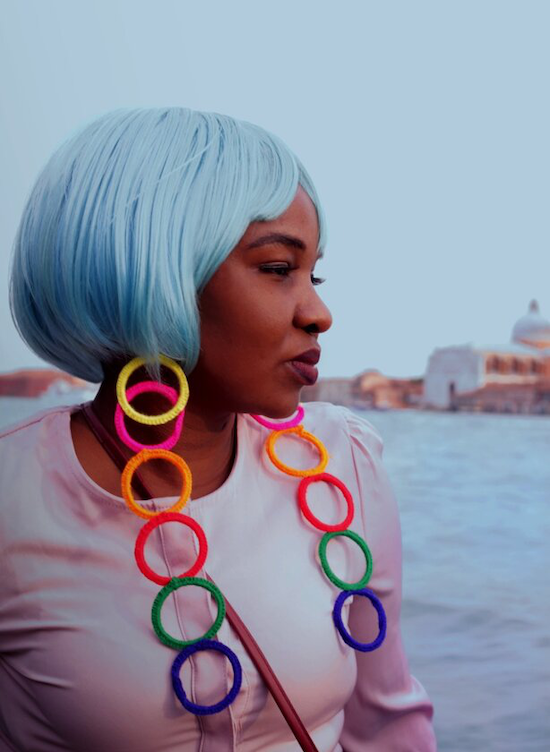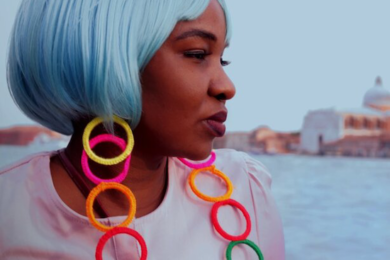Listening to MC Yallah speak over the phone is sufficient evidence that she was born to rap. Every word is underpinned by a steady rhythm that transforms the simplest of sentences into a grand statement, or an anecdote into a ready-made story. Don’t let that measured spoken pace fool you, though: her music marries dark, eccentric, electronic beats with a smooth, break-neck flow. If you’ve seen her live, you’ll know Yallah can even rap effortlessly over singeli beats, that can reach anywhere up to 300bpm.
To her family and friends, she’s Yallah Gaudencia Mbidde. But to the underground Ugandan hip hop scene, she’s MC Yallah, a musician who has developed her reputation as a formidable rapper since the nineties. Some may know her from her old stint as a NewzBeat presenter, a television programme that skirted censorship laws by rapping about current affairs and controversial topics. Now, she’s known as part of the prestigious collective Nyege Nyege, where she met label founders Derek Debru and Arlen Dilsizian whilst working at NewzBeat.
Founded in 2013 and based in Kampala, Nyege Nyege has spawned a universe that comprises of music as transgressive as its festival, which Uganda’s minister of ethics attempted to cancel in 2018. Part of its creative ethos are the residencies held by outsider producers, who stay at Nyege Nyege’s studio dubbed ‘The Villa’, where local artists collaborate to create futuristic interpretations of African music.
Although MC Yallah had found sporadic success with singles, it was with Nyege Nyege where she began to flourish creatively. With French producer, Debmaster, she forged a new path with her sound to create her debut Kubali (2019), whilst also featuring on Japanese producer DJ Scotch Rolex’s mixtape, Tewari (2021). Whilst she stays with Debmaster and Scotch Rolex in Berlin, MC Yallah talks to tQ about her upcoming projects.
You’re able to rap in four different languages: Luganda, Kiswahili, English, and Luo. How do you decide which language to rap in?
MC Yallah: When Debmaster sends me a beat – or [Scotch Rolex] Shige sends me a beat and I first listen to it, and I start flowing on it on all the languages. Yes. Then, after trying to flow with all the languages, I go back and I see. I look into all the languages and see which one was I flowing in easily. There are some times I can get a beat, and maybe I say I’m going to rap in Luganda on this beat. I try so much to do it the Luganda way, but I feel the Luganda way is not coming out properly. Then I try Luo, and I see Luo is coming out properly, so I say I’m gonna use Luo for this beat.
How do you feel about rapping in English, compared to other languages?
MCY: I rarely rap in English. I rap in languages that I’m comfortable with. I don’t find it interesting for me to speak or rap in English. English rap started from the USA – we respect these artists so much. Look at Jay Z, Tupac, Eminem. These guys, these are some of the dopest rappers, the dopest writers. They inspired us to love hip hop. But if I come rapping in English, my dear? Even if I have sick lyrics, people are gonna compare me to Jay Z. I don’t wanna be compared lyrically to these men, I accept them as masters of that. In order to penetrate and get there as in with English, I can get their attention with my Lugaflow.
So why did you decide to switch up your sound to something experimental?
MCY: I did that because first of all, I felt in Uganda, they were not supporting hip hop – even the old-school and trap that I was doing before. So I was struggling and it was so frustrating for me. I even wanted to quit, you know, and do the other people’s types, but I stuck on until Arlen met Debmaster, and he introduced some beats to me from Debmaster. And he was like, Yallah – try to flow on that beat. And I was like, it might be new for me, but I have to try this type. Because I have always liked being challenged. And I like doing things that I usually don’t do, or things that people don’t usually do.
Have you ever felt underestimated in your career because you were a woman?
MCY: Ah, yes. You know, as female rappers, we are very few in this world, and the hip hop game is dominated by the male. We have to come out and prove we can come out and do this thing even better than male artists. That is why even most of my beats are very complicated – not every female rapper can rap on them. Not every male rapper can rap on them. In Luganda, there are some rappers who come around me or the studio, they gave them this beat to flow on – they cannot! They cannot. I love a beat that will challenge me to do something insane which another person might not just do.
How did you get in touch with Nyege Nyege?
MCY: I met with one of the guys, Derek, in 2013, before even Nyege Nyege was created. We were doing some programme on national TV, NewzBeat. That is how I met Derek because he was also working with those people. We worked together in the news and became friends, family. They knew that I was a good rapper, and that’s why they got me also to do that job of reporting the news. Then after, in 2015, that is when they started Nyege. I was like okay, my brothers are starting this, let me be a part of it.
How do you then feel about getting signed to Matador?
MCY: It’s a respectful label and they work hard, and I think it’s not a bad idea. For me, as long as Nyege Nyege is still part of it, yeah. I told them, explain to me this: if you are saying you’re going to take Yallah to Matador, does it mean I have nothing to do with Nyege Nyege? And they told me no, I’m working with them, but they leave us in charge of different things.
Matador is an English-speaking label – what do you hope English speakers can take away from your music?
MCY: Even if they don’t understand, it’s the impact that I leave on them. They may not understand what I’m saying but the impact, the energy! Music speaks to the hearts of the people; even if you don’t understand, the beat itself can try to interpret for you what this person is saying. So I believe that even if the USA is an English-speaking country, they will still vibe with these languages.
You have an upcoming LP, LIONESS. How does LIONESS differ from Kubali?
MCY: I thought with LIONESS, I came on more hard. OK: on Kubali, I was hard. On this album, I was more aggressive. Rapping faster in some tracks than Kubali. But what I also love about the album is that it has fast songs, it has slow songs, there is even a love song on there. I love it because it has a couple of different interesting styles and the rapping is different every beat. It’s an album you’d want to listen to every song because they are different in their own way.
One of the tracks on that album is ‘No One Seems To Bother’. What inspired that song?
MCY: We recorded the song after George Floyd, Black Lives Matter. You can give somebody 50 euros and ask them to kill someone, and they take away that person’s life – they don’t care. In Uganda, there’s a lot of crap happening, you know? Ladies raped and killed, guys being killed like nothing because they have to steal. South Africa, how we lost Nigerians and Kenyans some three, four years ago. I was seeing hatred, and people don’t care so I told Khanja, we need to sing about this. We need to start caring about each other. The politicians – we vote them into parliament seats, and they tell us, we are going to build this for you, etc., and when we vote them in – they do nothing. They don’t care about us.
What was it like working with Lord Spikeheart?
MCY: He’s a very good artist and actually, he loves hip hop too. We decided we are working fully on an album – me, Lord Spike, and Scotch Rolex. It’s on another level, so we are working on an album now. So imagine: if that’s how ‘No One Seems To Bother’ makes you feel now, imagine what this other album is going to sound like… these ones are on another level!
MC Yallah plays Counterflows festival with Debmaster on Sunday 3 April



